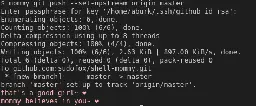moonpiedumplings @ moonpiedumplings @programming.dev Posts 26Comments 565Joined 2 yr. ago
I'm not spotting it. "AI" is only mentioned once.
The key and secret in the docker compose don't seem to be API keys, but keys for directus itself (which upon a careful reread of the article, I realize is not FOSS, which might be anpther reason people don't like it").
Directus does seem to have some integration with openai, but it requires at least an api key and this blog post doesn't mention any of that.
The current setup they are using doesn't seem to actually connect to openai at all.
There’s only one project that provides truly static/relocatable python that work on both glibc/musl: https://github.com/leleliu008/python-distribution
There is the python provided by APE/cosmo. They also have two other distributions containing various goodies, pypack1, and pypack2. https://cosmo.zip/pub/cosmos/bin/
But this came at the cost of discontinuing support for Android & Windows
I don't care about android support, but for the competition, and I don't really know about Windows support. Right now, RDP is used to authenticate and managed the machines, but maybe a portable VNC we can quickly spin up, so more than one person can be on the same machine, would be useful.
My original thought was to replace in place, insecure services with secure one's via something like docker containers or nix. But I think many of the machines have too little ram bundled libraries for the services to be viable. I actually tested replacing apache, but it simply wouldn't launch (I think the machine only had 2 GB of ram?).
There are a few reasons why I really like it being public, even though it means I have to be careful not to share sensitive stuff.
- It creates a portfolio for me (I'm an undergrad) because I document my projects on there
- When asking for help with certain complex things, it's really easy to simply link to my blog, since I document almost everything I've tried and why it did or didn't work. Here's a recent example
- I can share cool stuff I have saved, like my lists of learning resources or lists of software, with others easily.
This isn't exactly what you want. But I use a static site generator, with a fulltext search engine (that operates entirely locally!), called quarto. (although there are other options).
Although I call it a "blog", it really is more of a personal data dump for me, where I put all my notes down and also record all my processes as I work through projects. Whenever I am redoing something I know I did in an old project, or something I saved here (but disguised as a blogpost), I can just search for it.
Here is my site: https://moonpiedumplings.github.io/ . You can try search at the top right (requires javascript).
Are you using rpmfusion?
Lol I misread it too.
There is literally no way to do performant e2ee at large scale. e2ee works by encrypting every message for every recipient, on the users device.
At 1000 users, that's basically a public room.
I have been using your stuff since they were called toolpacks.
https://moonpiedumplings.github.io/playground/ape-experiments/
Welcome to Lemmy, Azathothas. It's nice to see more and more usernames I recognize show up here.
6 downvotes? Wow. Art appreciation really is a dying skill.
Three options:
People use these to run Wine inside them and play Windows games on Android devices.
I think a browser extension, similar to tor snowflake would be a good way to do this.
There a source port of at least portal 1.
https://github.com/AruMoon/source-engine
Here's the active fork of the original project. Going through the issues of the original project, it seems to have support for building for 64 bit platforms.
No portal 2 support though. Although mentioned in the issues of nileusr's repo is this: https://github.com/EpicSentry/P2ASW , which is interesting
Unlike a remote desktop, Puter is entirely in Javascript, where all the code runs on the user's local device, in their web browser. This makes it vastly more resource efficient than a full virtual machine (or container if you are using something like kasmweb), and thereby cheaper to set up.
It doesn't work for everything, but for the apps that do run a browser, like VSCode, it offers a much cheaper way to run those in a whole "environment" (rather than deploying them seperately). It's overall way less costly to VSCode remote into one server with 4 GB of ram, then it is to deploy a 4 GB ram instance just so there is enough ram for a GUI.
But wait! Why would a corporate product come with a variety of games for people to play? 🤔
That's because although this is a legitimate product, and a legitimate business, the true, actual usecase of Puter (and similar web desktop environments) is for students who want to play arcade games during class. Because of how efficient and easy they are to host, they can be hosted for free on a variety of platforms, allowing students at middle and high schools (12+ years old, but before college), to get around content blocking restrictions by rapidly migrating it from one hoster, ip address, or domain name to another if it gets blocked. This lets them access arcade games during class so they don't get bored.
Comparatively, the free VPS tiers often do not have enough resources for a desktop (plus gaming through remote desktop kinda sucks), and students aren't going to be eager to pay for stuff (have you seen AWS ec2 prices?!?).
Puter does not seem to have this (at least, not explicitly), but a very similar project, AnuraOS comes with a "web based proxy", that allows users to get around content filtering systems and view other sites that would normally be blocked.
You should look into "Configuration as code", where you use automation via various methods and store the code in a git repo. The other commenter in the thread is a good example of this methodology, using Terraform and Ansible, but there are many ways to do this.
This is only one half of the open source. Those scripts are not poweshell or bash scripts, but instead something simimar to Ansible, run through the Windows AME wizard.
Which I cannot find the source code for. Great!
I think this is the command line onlu version, but the GUI versiom appears to be closed source.
No, this one is different. It's not an ISO you download (those are extremely sus and you would be right to be skeptical of them), but instead an open source set of scripts you apply to an existing Windows OS.
Edit: see my comment below, it seems to be partially closed source.
There are open source tools for analyzing if github stars are fake, and they work reliably.
The kind of people that fake reviews/stars target are not the kind of people that are going to be verifying things.
As long as Amazon doesn't crack down, there isn't really a need to game the system.
On a Samsung Galaxy? I have one and am also similarly frustrated with the changes, but it seems like the support for custom roms is poor.
I think the mistake is they titled it "The last note taking app you'll ever need" instead of "The last note taking app I'lll ever need"
Yes, seriously. The article seems to talk mostly about their personal usecases, which is fine. This app is great and it works for them. But it won't work for everybody and the title should probably respect that instead of having a grating title that evokes a knee jerk reaction.
Databases are annoying it is legitimately more difficult to export data from a database to another, than it is to copy markdown notes from one folder to another. In addition to that, there are also tools that process markdown and do cool stuff with, like pandoc, beamer, revealjs, etc, which can't really be done with the more opaque database format.
Also this notetaking service only appears to work while online. Again, fine for them — but a dealbreaker for many people.
Debian's install wizard has a few frustrations in it. Like here's an example: https://moonpiedumplings.github.io/projects/build-server-3/#installing-debian
You cannot simply click next and get a working Debian system all the time.
There is also the root/user password thing (and no, "read the content" does not work if you just said click next + other installers don't have this confusion) + a few other stuff.
There doesn't appear to be a limit to the maximum size the KDE cursor can get when you shake it.
There doesn't appear to be a limit to the maximum size the KDE cursor can get when you shake it.
There doesn't appear to be a limit to the maximum size the KDE cursor can get when you shake it.
shell-mommy is a program that encourages users while using command line applications.
shell-mommy is a program that encourages users while using command line applications.
PSA: You should know that Debian Trixie/Testing does not receive security updates in a timely manner, and is not intended for production use
AnuraOS — web based OS that uses a wasm emulator to give you a real linux system, running entirely in your browser
AnuraOS — web based OS that uses a wasm emulator to give you a real linux system, running entirely in your browser






